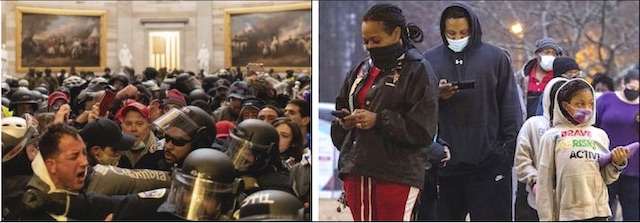On Epiphany, Jan 6, 2021, cataclysmic events struck our nation, and many people of faith wonder “where is God’s hand in all this?” Consider: as a sitting President goaded an angry mob to march on the Capitol building, the legislative branch gathered there to fulfill a Constitutional mandate. As white supremacists attacked the Capitol, black voters in Georgia turned the tide of the U.S. senate. As the federal police at the Capitol asked for assistance, another federal force at the Pentagon denied their request.
Coincidences… or paradoxes of divine purpose? And if the latter, how is it that Christians outside the People’s House prayed for the rioters while Christians on the inside prayed for their lives… all in the name of God’s child in the manger?
As we rush to ask”who is accountable” for the riot (rightly so), faith leaders must also ask, “where is God leading us on this day of Epiphany?” The coming President claims, “This is not who we are as a nation,” while black and civil rights leaders claim, “this is exactly who we are…” again a paradox within providential purpose.
Theologians from Augustine to Barth have spoken of “hidden providence” throughout the ages. Barth, in particular, emphasizes that providence is the faith that all of creation and history is a testimony to the glory of God’s eternal decision to be in covenant with humanity. The final meaning remains hidden, until the final day of revelation; but in the meantime humans “are freed to see this rule of God in world-occurrence…” and in “very definite events” (Church Dogmatics III.3, Par 48, 2).
In the definite events of Epiphany 2021, what can we see through faith?
On the Epiphany in Bethlehem, history also erupted in paradox. The Light of the world in that manger was greeted by foreign magi, and the babe was hunted down by a local king. It was a day of love and judgment–which go hand in hand in God’s ways. So too the paradoxes of Jan 6, 2021, as we are called to discern and decide as a people. We are being judged for this torn nation we have created, and we are being challenged to become the interwoven nation we are called to be. The paradox is essential to discerning the choice we have, and how providence will reckon with us.
The canon lawyer, John Anster, wrote: “The moment one definitely commits oneself, then Providence moves too.” I would invert that, to say, “when a moment of providence is shown, then we must commit ourselves to act.”
